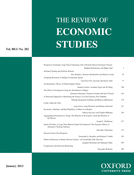-
Views
-
Cite
Cite
Christian Dustmann, Tommaso Frattini, Ian P. Preston, The Effect of Immigration along the Distribution of Wages, The Review of Economic Studies, Volume 80, Issue 1, January 2013, Pages 145–173, https://doi.org/10.1093/restud/rds019
Close - Share Icon Share
Abstract
This paper analyses the effect immigration has on the wages of native workers. Unlike most previous work, we estimate wage effects along the distribution of native wages. We derive a flexible empirical strategy that does not rely on pre-allocating immigrants to particular skill groups. In our empirical analysis, we demonstrate that immigrants downgrade considerably upon arrival. As for the effects on native wages, we find a pattern of effects whereby immigration depresses wages below the 20th percentile of the wage distribution but leads to slight wage increases in the upper part of the wage distribution. This pattern mirrors the evidence on the location of immigrants in the wage distribution. We suggest that possible explanations for the overall slightly positive effect on native wages, besides standard immigration surplus arguments, could involve deviations of immigrant remuneration from contribution to production either because of initial mismatch or immigrant downgrading.



